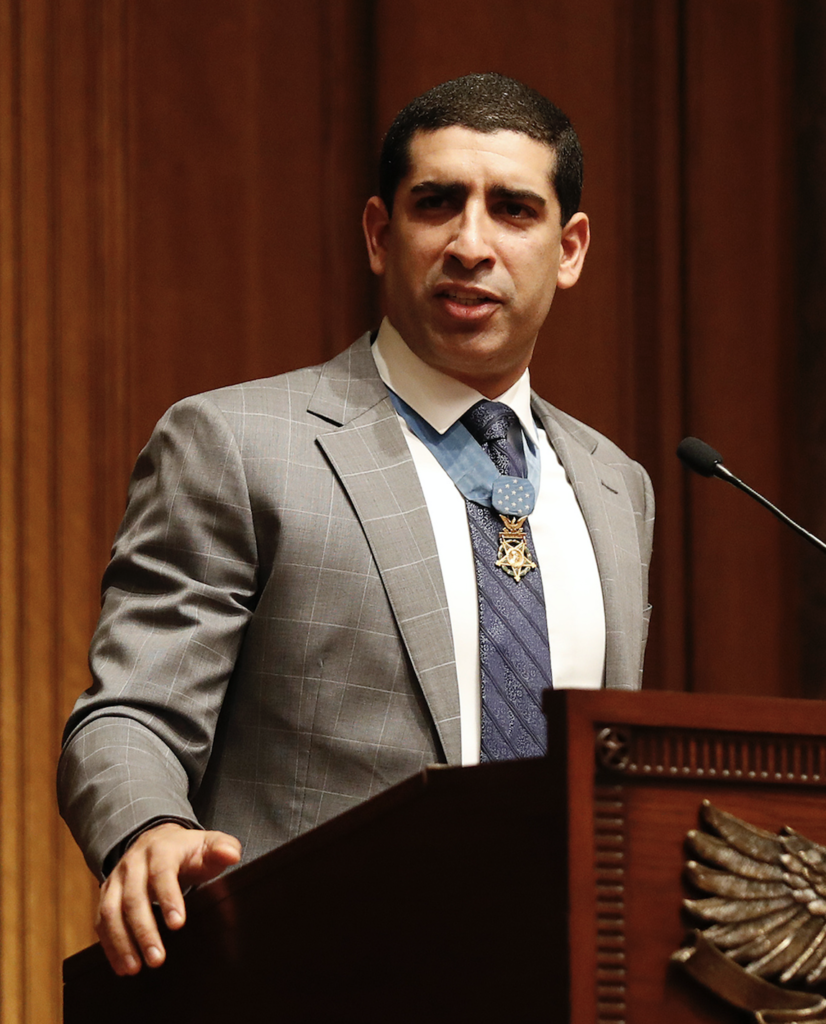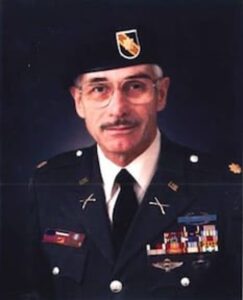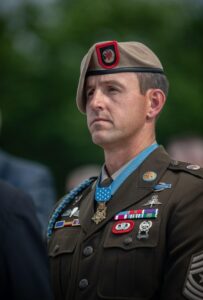- Recipient: Florent A. Groberg
- Branch: U.S. Army
- Combat: Global War on Terrorism (Afghanistan)
Flo’s story is a story like many immigrants before him: one of worry and doubt, immersion and opportunity, and, ultimately, deep gratitude for a new country. It might be hard to imagine a kid from France learning to speak English by watching Hollywood war movies like Rambo and Platoon, but that’s exactly how Florent “Flo” Groberg did it as a 12-year-old immigrant living in Bethesda, Maryland. The young student went from not being able to speak English to taking Honors English in just a few years.
Born on May 8, 1983 in Poissy, France, Groberg’s formative years were filled with travel and diverse experiences being raised with a French mother and an adoptive American father. His father, Larry Groberg, was a businessman whose travels took the family around the world. The family lived in France and Spain before ultimately moving to the United States and settling in Bethesda, Maryland. Groberg continued his studies and began to excel in school.
In 1996, Groberg arrived home from a field trip only to learn that his beloved Uncle Abdou, a volunteer in the Algerian Army, had been brutally murdered by terrorists. It was Uncle Abdou who had once told young Groberg, “Freedom has to be earned. Sometimes, you have to fight for it.” Five years later, while attending the University of North Carolina-Wilmington, Groberg watched as terrorists struck again, flying planes into the World Trade Center on September 11th. In a twist of fate, Groberg became a naturalized citizen on February 27th, 2001 – just 7 short months before September 11th.
Like many young Americans, both immigrant and native-born, Groberg wanted to answer the call: terrorists had attacked his family abroad and now they’d forever altered life in his adopted country. In 2008, after finishing his degree at his father’s urging and renouncing his French citizenship, Groberg joined the United States Army. As Groberg put it: “There was no way I was going to stand on the sidelines and not be a part of the solution.”
Discovery and Loss in Afghanistan
After basic training, officer training, and a grueling two-month stint in Ranger School, Groberg learned a lot about himself as a leader. Out of 300 students, he was one of only 69 soldiers to graduate. “I knew that those 61 days of hell had made me a better soldier, and a better person.” Just six weeks later, Groberg found himself on his first tour in Afghanistan, leading a platoon through the Pec River Valley, considered then to be one of the most dangerous places on the planet. He witnessed the bravery and sacrifice of his men who guarded outposts 24/7, and Groberg was left awestruck by young schoolgirls who spoke to him in English, asking that he keep them safe. In the “single best moment” of the tour, he made a promise to do just that. When he returned for a second tour, that promise would be put to the test.
In his new role as a security detachment commander with the Task Force Mountain Warrior during his second tour, Groberg was responsible for coordinating all air and ground movements for Colonel James Mingus as he traveled throughout the country. He was so successful as the leader of the security detail that he received an email saying he would be promoted to captain after his August 8th mission was completed. That date soon arrived.
On August 8, 2012, Groberg and his team were tasked with transporting a team to a meeting in Asadabad. Amongst the personnel was a fellow immigrant, an American-Egyptian foreign service officer, and a “bona fide humanitarian…every bit as brave as the servicemen who walked beside him.”
But as soon as their helicopter landed, Groberg’s comfort with the mission shifted to unease. He only had two additional U.S. soldiers, one American contractor, and five Afghan Army soldiers, as opposed to the typical 15-man team, and he worried his unit, which was meant to “protect” rather than “fight,” was more vulnerable than ever. The armed men formed a diamond around the U.S. and Afghan officers they were guarding, and with Groberg at the head of the group, they began the long procession toward the governor’s compound.
It was at a bridge crossing that Groberg noticed signs of trouble: two motorcyclists abruptly abandoning their bikes and a third man acting erratically. Knowing that something was dangerously awry, Groberg began moving toward the wandering figure. The entire course of his life would be forever altered by the 8 seconds that followed.
When he made contact and put his hands on the chest of the third man, Groberg felt a vest and instantly realized he was face-to-face with a suicide bomber. Their thumb held on to a “dead man’s trigger”. Groberg immediately began to push the suicide bomber away from the formation. Upon being turned around and then pushed down to the ground by a fellow sergeant, Andrew Mahoney, the suicide bomber fell to the ground for the last time – the vest detonated.
The blast was so strong that it also shook the surrounding buildings – a spray of ball bearings and debris covering the area in dust and destruction. But Groberg didn’t see or hear a thing. When he regained consciousness, he found himself 15-20 meters away, near the bridge. His ears were ringing brutally, and his fibula was sticking out of his left leg, which was missing more than half of its calf muscle. Ever the soldier, Groberg cocked his pistol and began dragging his wounded body toward safety.
Ultimately, the explosion killed four members of the formation and injured several others. Groberg reminds us of the four men who lost their lives that day, respectively, for their sacrifice and bravery: Army Command Sgt. Maj. Kevin J. Griffin, 46; Army Maj. Thomas E. Kennedy, 35; Air Force Maj. David Gray, 38, and foreign service officer Ragaei Abdelfattah, 43.
A Long Road Ahead
Once in treatment in the hospital, Groberg declined an amputation, choosing, instead, to keep his leg and endure 33 surgeries and hundreds of hours of physical therapy. Beyond regaining his ability to walk, Groberg had sustained a blown eardrum and a mild traumatic brain injury. After three years of recovery at Walter Reed Medical Center, Groberg was medically retired from the military in 2015. That same year, in a White House ceremony with President Obama, Groberg was awarded the Medal of Honor for his selfless act of intrepidity and gallantry.
As the President explained, Groberg had saved the lives of at least 10 others that day, and unbeknownst to him at the time, a second bomb went off prematurely due to his actions, saving even more lives. Like on that fateful day in Afghanistan, Groberg has continued to apply himself with the same tenacity and spirit to his own life while also centering his philanthropic efforts on veteran causes.
A fellowship at the Defense Intelligence Agency kicked off his post-military career, where he has gone on to continue to find purpose after active duty in veteran-focused causes, completing a Master’s degree, while also working in the tech sector to continue to bridge the gap between the private sector technology and the military.
Groberg was originally inspired to join the military in order “to earn the right” to call himself an American. His service and sacrifice went above and beyond the average citizen, but as Groberg continues to insist, “It’s not my medal. It’s the country’s medal. I’m just a courier.”




